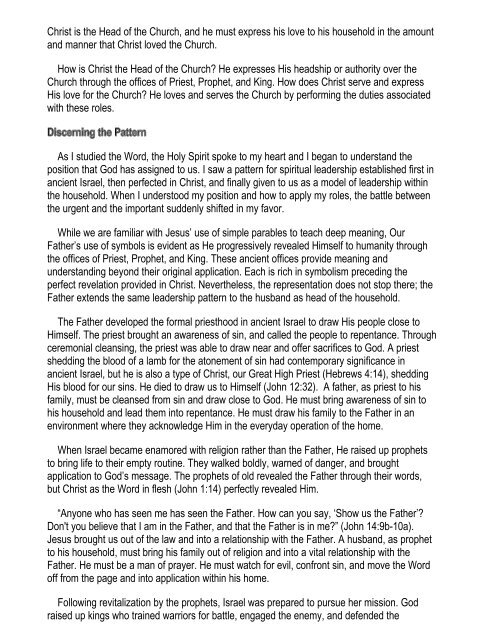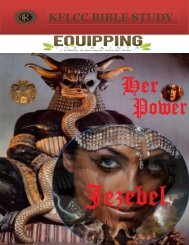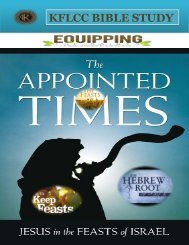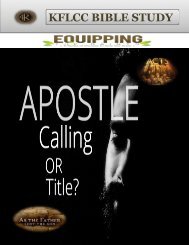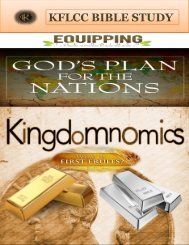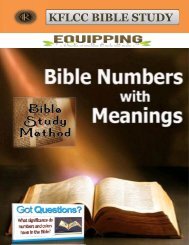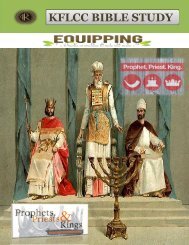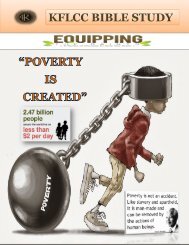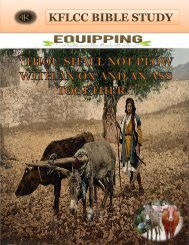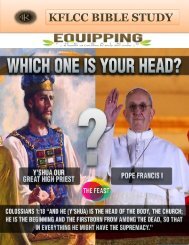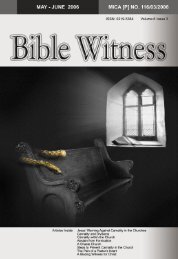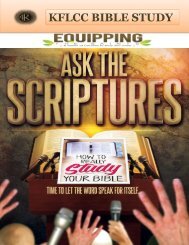Prophet Priest King II
Bible Study
Bible Study
Create successful ePaper yourself
Turn your PDF publications into a flip-book with our unique Google optimized e-Paper software.
Christ is the Head of the Church, and he must express his love to his household in the amount<br />
and manner that Christ loved the Church.<br />
How is Christ the Head of the Church? He expresses His headship or authority over the<br />
Church through the offices of <strong>Priest</strong>, <strong>Prophet</strong>, and <strong>King</strong>. How does Christ serve and express<br />
His love for the Church? He loves and serves the Church by performing the duties associated<br />
with these roles.<br />
As I studied the Word, the Holy Spirit spoke to my heart and I began to understand the<br />
position that God has assigned to us. I saw a pattern for spiritual leadership established first in<br />
ancient Israel, then perfected in Christ, and finally given to us as a model of leadership within<br />
the household. When I understood my position and how to apply my roles, the battle between<br />
the urgent and the important suddenly shifted in my favor.<br />
While we are familiar with Jesus’ use of simple parables to teach deep meaning, Our<br />
Father’s use of symbols is evident as He progressively revealed Himself to humanity through<br />
the offices of <strong>Priest</strong>, <strong>Prophet</strong>, and <strong>King</strong>. These ancient offices provide meaning and<br />
understanding beyond their original application. Each is rich in symbolism preceding the<br />
perfect revelation provided in Christ. Nevertheless, the representation does not stop there; the<br />
Father extends the same leadership pattern to the husband as head of the household.<br />
The Father developed the formal priesthood in ancient Israel to draw His people close to<br />
Himself. The priest brought an awareness of sin, and called the people to repentance. Through<br />
ceremonial cleansing, the priest was able to draw near and offer sacrifices to God. A priest<br />
shedding the blood of a lamb for the atonement of sin had contemporary significance in<br />
ancient Israel, but he is also a type of Christ, our Great High <strong>Priest</strong> (Hebrews 4:14), shedding<br />
His blood for our sins. He died to draw us to Himself (John 12:32). A father, as priest to his<br />
family, must be cleansed from sin and draw close to God. He must bring awareness of sin to<br />
his household and lead them into repentance. He must draw his family to the Father in an<br />
environment where they acknowledge Him in the everyday operation of the home.<br />
When Israel became enamored with religion rather than the Father, He raised up prophets<br />
to bring life to their empty routine. They walked boldly, warned of danger, and brought<br />
application to God’s message. The prophets of old revealed the Father through their words,<br />
but Christ as the Word in flesh (John 1:14) perfectly revealed Him.<br />
“Anyone who has seen me has seen the Father. How can you say, ‘Show us the Father’?<br />
Don't you believe that I am in the Father, and that the Father is in me?” (John 14:9b-10a).<br />
Jesus brought us out of the law and into a relationship with the Father. A husband, as prophet<br />
to his household, must bring his family out of religion and into a vital relationship with the<br />
Father. He must be a man of prayer. He must watch for evil, confront sin, and move the Word<br />
off from the page and into application within his home.<br />
Following revitalization by the prophets, Israel was prepared to pursue her mission. God<br />
raised up kings who trained warriors for battle, engaged the enemy, and defended the


